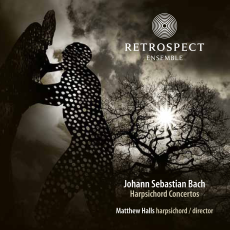Retrospect Ensemble - Bach: Harpsichord Concertos - International Record Review
Well used as we are to hearing those groups which specialize in Baroque music inject their performances with considerable verve and energy - as if, by making all sound so very upbeat, they are trying to show that Early Music is still very much alive and relevant to twenty-first century ears - this high-octane romp through four of Bach's solo harpsichord concertos still manages to take the breath away. This is not just exuberant playing; it verges on the manic, with so much energy bristling out of every player that were some Cambridge boffin to find a means of harnessing it to the National Grid, it could light up a fair-sized town for a couple of nights.
Leading the pack, in every way, is Matthew Halls and his hasty harpsichord. Here's a man for whom a trill is not mere decoration but something of an obsession. There are more trills per bar in the first movement of BWV1057 than even the most ornament-addicted keyboard player could usually manage. And what trills! Lavish, exuberant and delivered with such outrageous flourish that one wonders whether performance-enhancing substances were not at play somewhere in the background. This movement - a reworking of the fourth Brandenburg Concerto - has a pretty extravagant harpsichord part at the best of times; with Halls's array of dazzling trills and extraordinarily busy finger work it takes on almost a fevered restlessness.
Other fast movements continue in much the same vein, the opening movement of BWV1052, with its menacing unisons, turning into something of a race between the harpsichord and strings, while the scampering scales and showers of harpsichord notes in the outer movements of BWV1055 lend it a peculiarly picturesque quality. Such restless tempos and busy articulation, coupled with a forest of trills and ornate decorations, could leave the unwary listener in a state of shock, bewildered by the sheer energy of it all, but few will remain unimpressed by these unashamed displays of extreme virtuosity.
If one might look to the slow movements for a brief respite from all the super-charged action, one looks in vain. The tempos themselves rarely dip down to the moderate, and even then there is a sense of pushing forwards relentlessly, the harpsichord forever urging the other players on. Sadly, this leads to a persistent nagging worry that the urge to keep pressing onwards from the keyboard undermines the overall ensemble. That is certainly the case with the slow movement of BWV1052, where the harpsichord's throbbing pulse is always a split second ahead of everyone else's.
This brings us to the question of authenticity. Now in its third year of existence, the Retrospect Ensemble claims to be ‘embracing the practices, styles and aesthetics of former ages'. For my part, I simply cannot imagine the students playing in Leipzig Collegium Musicum of the 1730s and 1740s, for whom these four concertos were originally conceived, possessing either the dazzling virtuosity or the unflaggable energy we hear on this disc, while my mental image of Bach does not lend itself to a man quite so full of fun and unfettered exuberance as is depicted here. But does it really matter? Textural and instrumental authenticity is one thing; aural perceptions are another, and if this might all seem utterly outrageous to eighteenth-century ears, those of us hearing it in the twenty-first century cannot but find this action packed, fun-filled approach immensely communicative.
There is an infectious enthusiasm in all of these performances, which, coupled with the full-blooded recorded sound and Gawain Gletnon's eminently readable booklet notes, makes this a must-have music disc for all music lovers.

